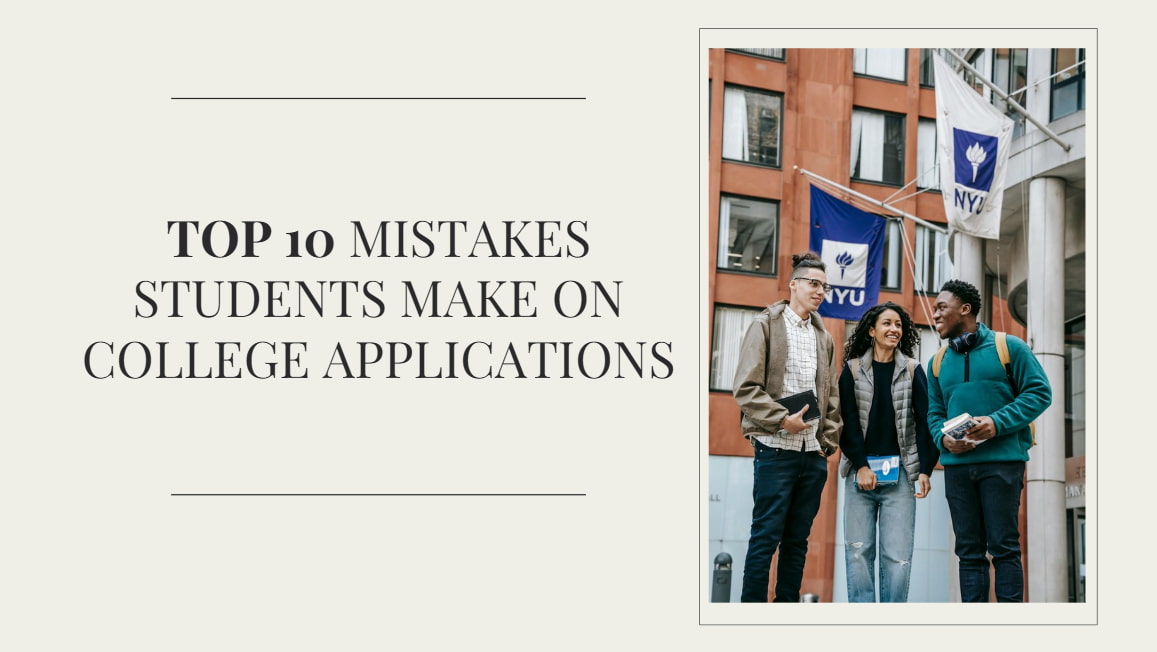You may be managing deadlines, personal statements, and perhaps a little fear this year as you fill out college applications. I’ve been an admissions expert for more than ten years, and I’ve fixed just about every error you can think of. College application mistakes can keep many students from their dream school, even if they have good grades.
So, what are the most common mistakes students make during the college application process? I see the same 10 things over and over again, and here’s how you can avoid them.
# 1. Hurrying at the Last Minute
One of the worst college application mistakes you can make, in my opinion, is to wait until the last minute. Adrenaline could help you study for an exam, but it doesn’t help you write a perfect application. Moreover, admissions officers can see right away when something was put together at the last minute.
Just create a timetable as soon as you can:
- Make the application process easier by breaking it down into smaller tasks, such as writing your common app essay, gathering required documents, editing, and submitting.
- Then, give each assignment a due date that is well before the real deadline. That way, you’ll still have a buffer if anything unexpected happens (and it always does).
A well-paced application not only looks better, but it also feels better to write. You’ll feel better about what you’re sending in, and that confidence frequently shows.
# 2. Same Generic Essay for All Colleges
One of the common college application mistakes to avoid is submitting the same essay to more than one institution without making any changes.
I completely understand why you want to do that. But from the point of view of admissions, a generic essay is a bad sign, which can hurt your chances.
For instance, if you write about how much you love business but don’t say how a particular school’s entrepreneurship center or worldwide internship program fits with your ambitions, it doesn’t work. Even worse, I’ve seen students leave the erroneous school name in their essays by mistake. That’s not a nice look.
Personalize your essay instead of writing from scratch. For example, you can mention:
- A professor whose study you find interesting.
- A class that fits with your school objectives.
- A club or organization for students that you can’t wait to join.
- Values or traditions that are important to you and fit with your personality.
You don’t have to rewrite the whole essay every time. But a few changes might indicate that you’ve done your study, and that counts.
# 3. Ignoring the Essay Prompt
When students ask me, “What are some common mistakes to avoid in college application essays?” I always answer: ignoring the prompt. It’s really a major issue today.
The committee will assume you don’t understand the task if you skip over the real prompt and write what you want to say. Even if your story is deeply personal, well-written, and full of heart, it won’t be good enough if it doesn’t answer the question.
To stay on track, I think you should highlight the most important parts of the prompt and come back to them as you write. Also, reread your essay with the question in mind. Think to yourself, “Did I really answer this?” If the answer is “no,” make the necessary changes.
I’ve noticed that students who answer the question come across as the most impressive.
# 4. Bragging too Much (or too Little)
Having confidence is great. Being cocky? Not really. But being too safe can also make your application easy to forget. This is one of the more subtle college application essay mistakes I’ve seen. Some students write as if they want to win an award, while others are too shy to talk about how well they’ve done.
The aim is to find balance. Give detailed examples of how you’ve helped instead of making broad claims. For example, you can mention how you helped raise $10,000 for a charity. All you need is to allow the outcomes to speak for you.
#5. Not Proofreading for Grammar and Spelling
Filler phrases, punctuation mistakes, and sloppy formatting all work against you. I’ve reviewed hundreds of admissions essays, and believe me, small errors often make a big difference. Errors in spelling, grammar, or even tone can send your hard work straight to the reject pile, especially at a highly selective school.
Below are some solutions for this common application mistake:
- Read your essay out loud. You’ll hear clunky phrases and repetitive words more easily.
- Use a checklist for grammar, punctuation errors, and formatting consistency.
- Have someone else proofread it. A teacher, counselor, or mentor can catch things you won’t.
- Review every supplemental essay separately—don’t assume they’re error-free.
Skipping this step is one of those college application mistakes to avoid at all costs. That alone can set you apart from the average applicant.

# 6. Listing Activities and Extracurriculars Without Explanation
Another mistake I often see is students stuffing their list of extracurriculars, but not explaining why those activities mattered.
Colleges don’t just want a list of accomplishments. They want to know what each activity meant to you. Did you grow as a leader? Did you solve a real problem? Did it shape your ambition?
The solution is to choose an option that best represents your personal development or interest, rather than trying to fit in every group or event. This way, you can easily avoid one of the most common mistakes on college application essay.
#7. Not Confirming Letter of Recommendation
It happens more than students think: you’re ready to hit submit, and suddenly you realize your letter of recommendation hasn’t been uploaded.
This is one of the most frustrating (and avoidable) mistakes on college application files. While teachers and counselors often do their best, it’s still your responsibility to make your application complete.
Here’s what you can do during the admission process:
- Ask early—preferably 4–6 weeks before your deadline.
- Provide a resume or summary of your strengths.
- Check the submission portal regularly.
- Politely follow up if needed. A short reminder email can go a long way.
Always keep an eye on those materials. It’s your name on the application, and the admissions office will hold you accountable, not your recommender.
# 8. Not Researching the School Before Applying
Applying to a school without learning about its core programs, campus culture, or values is one of the easiest ways to weaken your entire application. In fact, this mistake often leads directly to another common error: reusing the same essay for every school.
If you don’t research the school properly, you have no meaningful content to personalize your response. It may also lead to including details that don’t align with the school’s mission—something I mentioned in mistake #2.
To fix this, take time to research every college:
- Academic programs that match your interests.
- Campus values and community traditions.
- Clubs, student life, and unique opportunities.
Then, reflect that knowledge in your essay. This demonstrated interest helps your application stand out in a way that canned responses never can.
# 9. Too Many Clichés in Your Essay
Statements like “I’ve always wanted to help people” or “This experience changed my life” don’t mean much anymore. They’ve been used so many times that they’ve lost their meaning. This is one of the most frequent mistakes students make on their college applications—and it’s easily avoidable.
Instead of telling admissions officers that you’re passionate or hardworking, show it. Share a moment and give real-life examples.
You can describe personal details that make your story yours and write the kind of essay that couldn’t be written by anyone else. That’s the secret to standing out in a sea of applications.
# 10. Skipping Optional Sections
Some of the students see “optional” and think it means “not required.” I strongly disagree. Skipping optional essays or blanking on spaces meant for context is one of those common college application mistakes that many regret later.
Let’s say your grade in sophomore year dropped because of a family emergency. Or maybe you want to explain why a particular extracurricular means so much to you. Optional sections are your chance to give the admissions team more insight into your experience.
Use these sections to:
- Explain academic challenges or gaps in your record.
- Share more about an achievement or project.
- Expand on something briefly mentioned elsewhere.
The more thoughtful you are, the stronger your application becomes.
Final Tips on Avoiding Common College Application Mistakes
It’s hard to apply to college, especially for students who have to deal with transcripts, test scores, and questions about financial aid along with their essays. Sadly, even small mistakes like punctuation or formatting on your resume can hurt your chances of getting into a very selective college. That’s the reason why you should polish your application up a lot.
From my experience, students who work with one of the Best College Admission Consultants highly improve their chances. These experts know what colleges want, how to refine your academic programs list, and how to tailor your application to fit each school’s strengths.
So, if you want to avoid the most common errors, don’t rely solely on instincts. Get expert input where it counts.

